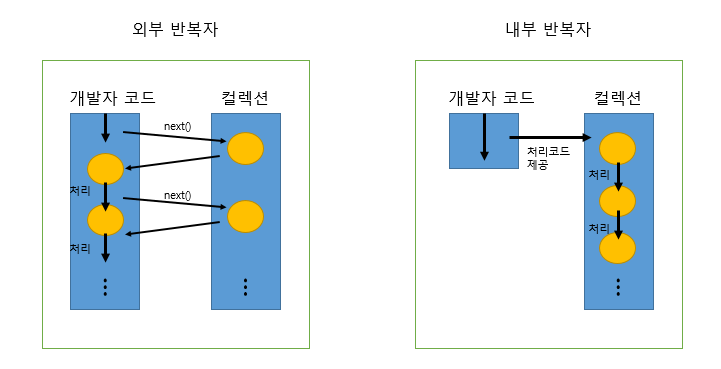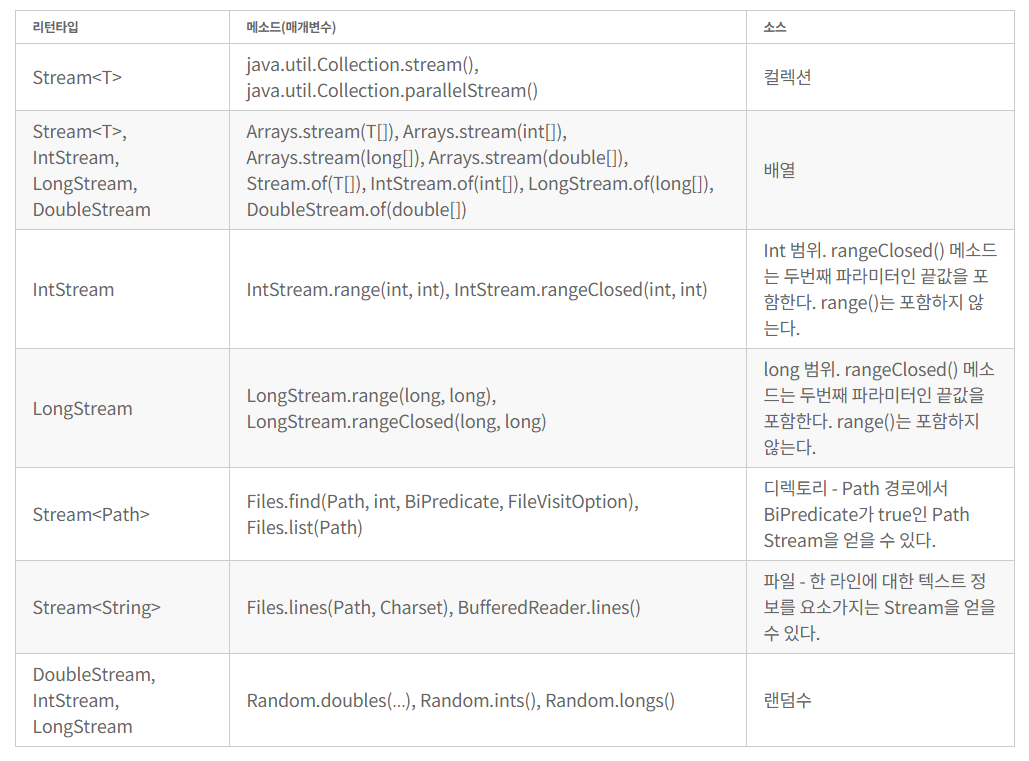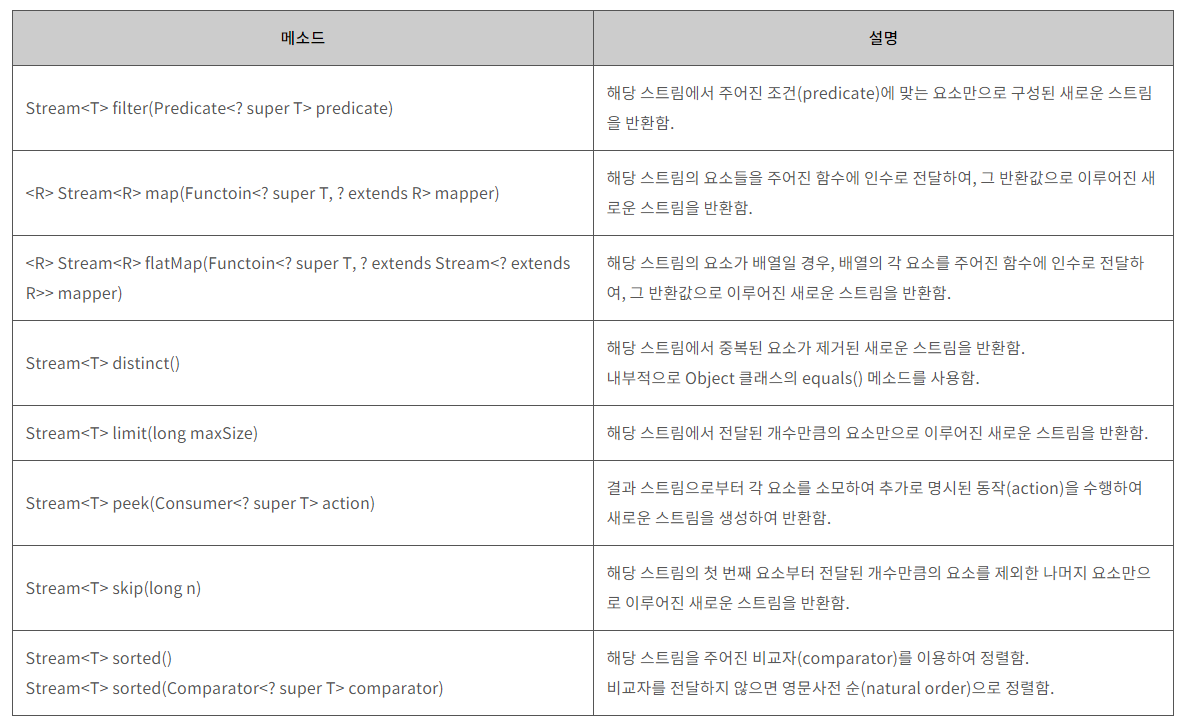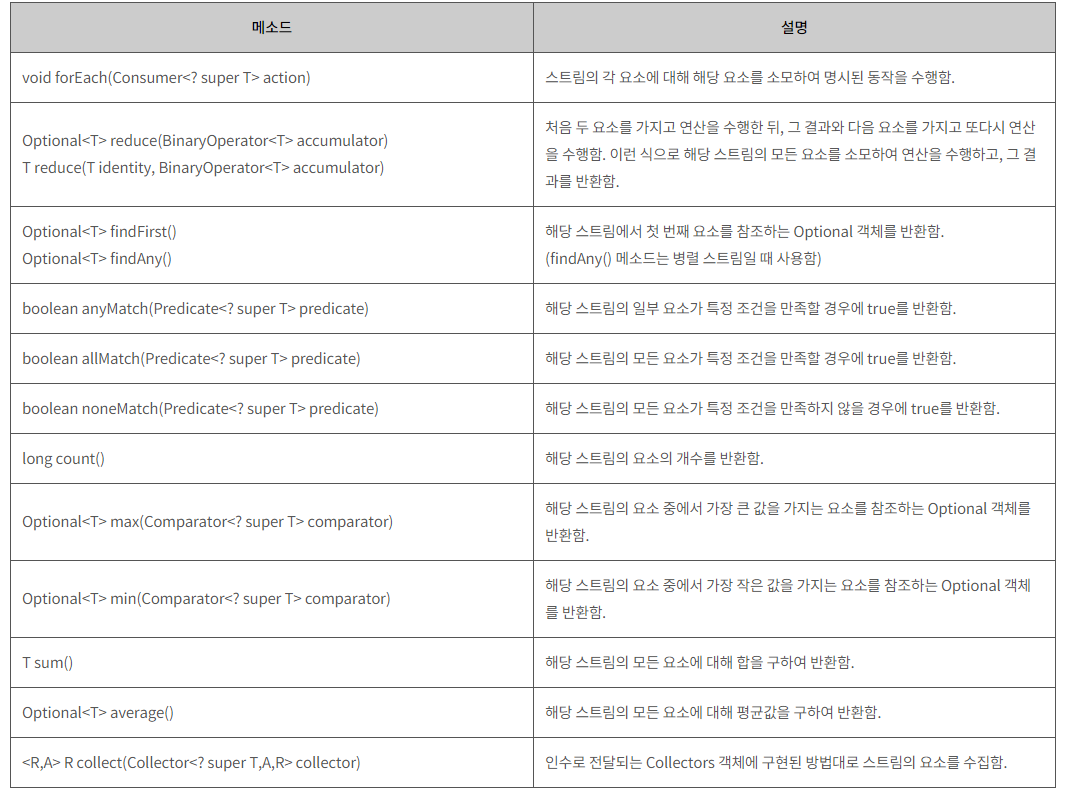Stream 이란?
Strem은 Java 8 의 기능 중 하나로, 리눅스에서 사용되는 파이프 라인 처럼 한번에 한 개 씩 만들어지는 연속적인 데이터 항목들의 모임이다.
Stream은 배열, List 등의 요소들의 처리를 담당한다.
기존 배열처리를 간단하게 해주며 Functional style로 처리할 수 있도록 해준다.
Stream의 특징
- 람다식으로 요소 처리코드를 제공한다.
List<String> list = Arrays.asList("홍길동", "신용권", "김남준");
list.stream().forEach(name -> System.out.println(name));-
스트림 연산은 원본을 변경하지 않는다. 즉, Immutable 하다.
-
내부 반복자(Internal iteration)를 사용한다.
-
외부 반복자 : 개발자가 코드로 직접컬렉션의 요소를 반복해서 가져오는 것을 말한다.
-
내부 반복자 : 컬렉션 내부에서 요소들을 반복시키고 개발자는 각 요소당 처리해야하는 코드만 제공하는 것을 말한다.

-
-
많은 Stream의 기능들은 Stream 자기 자신을 리턴한다. 이 방식은 처리 작업이 체인처럼 연결되어 큰 파이프라인처럼 작동 하도록할 수 있다.
List<Integer> list = Arrays.asList(3, 5, 2, 4);
list.stream().sorted().filter(e -> e < 5).forEach(System.out::println);- 멀티쓰레드 코드를 직접 구현할 필요 없이 데이터를 병렬로 처리할 수 있다.
🤚 병렬 처리?
병렬처리란, 한 가지 작업을 서브 작업으로 나누고, 서브 작업들을 분리된 스레드에서 병렬적으로 처리하는 것을 말한다.
- 스트림은 중간 처리와 최종 처리를 할 수 있다. 중간 처리에서는매핑, 필터링, 정렬 등을 수행하고 최종 처리에서는 반복, 카운팅, 평균, 총합 등의 집계 처리를 수행한다.
- 스트림은 딱 한번만 소비할 수 있다. 한 번 탐색된 스트림의 요소는 소비되고, 다시 탐색하려면 초기 데이터 소스에서 새로운 스트림을 다시 만들어야 한다.
Stream 사용법
Stream 객체 얻기

Stream 중간 처리 메서드
대표적인 메서드들

-
distinct()
어떤 스트림에서 중복되는 아이템들을 모두 제거해주고 새로운 스트림을 반환한다.
List<Integer> list = Arrays.asList(1, 2, 3, 3);
list.stream().distinct().forEach(System.out::println);
결과
1
2
3-
filter()
특정 조건으로 스트림의 요소를 필터링 하고 필터링된 새로운 스트림을 반환한다.
List<Integer> list = Arrays.asList(1, 2, 3, 4, 5);
list.stream().filter(e -> e > 3).forEach(System.out::println);
결과
4
5-
map()
각각의 요소들을 변경하여 새로운 스트림을 생성한다.
List<Integer> list = Arrays.asList(1, 2, 3);
list.stream().map(e -> e * 2).forEach(System.out::println);
결과
2
4
6-
flatMap()
배열로 감싸져 있는 모든 원소를 단일 원소 스트림으로 반환한다.
Integer arr[][] = { { 1, 2 }, { 2, 4 }, { 1, 5 } };
Arrays.stream(arr).flatMap(array -> Arrays.stream(array)).forEach(System.out::println);
결과
1
2
2
4
1
5
// 똑같은 결과를 map으로 하려면? 차이점을 확인해보자!
Arrays.stream(arr)
.map(array -> Arrays.stream(array))
.forEach(numbers -> numbers.forEach(System.out::println));-
MaptoInt()
map과 똑같은 기능을 하지만 IntStream을 반환한다.
mapToLong, mapToDouble 또한 특화 스트림으로 변환해 반환한다.
class Student {
String name;
int num;
Student (String name, int num) {
this.name = name;
this.num = num;
}
}
List<Student> students = new ArrayList<>();
students.add(new Student("James", 1));
students.add(new Student("Alice", 2));
students.add(new Student("Tom", 3));
int sum = students.stream().mapToInt(e -> e.num).sum();
System.out.println(sum);
결과
6 // 오류발생
int[] arr = students.stream().map(e -> e.num).toArray();
// 정상 작동
int[] arr = students.stream().mapToInt(e -> e.num).toArray();
-
asDoubleStream()
IntStream의 요소 또는 LongStream의 요소를 double 요소로 타입 변환해서 DoubleStream을 생성한다.
-
asLongStream()
IntStream의 int 요소를 long 요소로 타입 변환해서 LongStream을 생성한다.
-
boxed()
int 요소, long요소, double요소를 Integer, Long, Double 요소로 박싱해서 Stream을 생성한다.
Stream 최종 처리 메서드
주요 메서드들

-
allMatch()
Stream의 모든 요소가 조건을 충족하는지 확인한다.
List<Integer> list = new ArrayList<>();
IntStream.range(1, 5).forEach(e -> list.add(e));
boolean result1 = list.stream().allMatch(e -> e >= 1);
boolean result2 = list.stream().allMatch(e -> e >= 2);
System.out.println(result1 + " " + result2);
결과
true false-
allMatch()
Stream의 요소가 1개라도 충족하는지 확인한다.
-
noneMatch()
Stream의 모든 요소가 충족하지 않는지 확인한다.
-
count()
스트림의 요소의 수를 반환한다.
-
findFirst(), findAny()
스트림에서 첫 번째 요소를 참조하는 Optional 객체를 반환한다. findAny()는 병렬스트림에서 주로 사용한다.
🤚 Optional?
Optional 클래스는 Integer나 Double 클래스처럼 'T'타입의 객체를 포장해 주는 래퍼 클래스이다.따라서 Optional 인스턴스는 모든 타입의 참조 변수를 저장할 수 있다.
아직 Optional에 대해서는 공부를 충분히 하지 않았기 때문에 추후에 공부를 더 하고 설명에 대한 글을 써봐야 겠다..
List<Integer> list = new ArrayList<>();
IntStream.range(1, 5).forEach(e -> list.add(e));
Optional<Integer> a = list.stream().filter(e -> e > 1).findFirst();
System.out.println(a.get());
결과
2-
min(), max()
스트림의 요소 중에서 가장 큰 값과 가장 작은 값을 가지는 요소를 참조하는 Optional 객체를 반환한다.
-
sum()
스트림의 모든 요소의 합을 반환한다.
-
average()
스트림의 모든 요소의 평균을 Optional 객체로 반환한다.
List<Integer> list = new ArrayList<>();
IntStream.range(1, 5).forEach(e -> list.add(e));
OptionalDouble avg = list.stream().filter(e -> e > 1).mapToInt(e -> e).average();
System.out.println(avg.getAsDouble());
결과
3.0-
reduce()
reduce는 첫 번째와 두 번째 요소를 가지고 연산을 수행한 뒤, 그 결과와 세 번째 요소를 가지고 또다시 연산을 수행한다.
이런 식으로 해당 스트림의 모든 요소를 소모하여 연산을 수행하고 그 결과를 반환한다.
초기값이 있는 경우 반환 타입은 Optional<T>가 아닌 T 타입이다. 전달 받은 초기값과 동일한 타입을 반환해야 하기 때문이다.
Stream<String> stream1 = Stream.of("넷", "둘", "셋", "하나");
Stream<String> stream2 = Stream.of("넷", "둘", "셋", "하나");
Optional<String> result1 = stream1.reduce((s1, s2) -> s1 + "++" + s2);
result1.ifPresent(System.out::println);
// 초기값이 있는 reduce
String result2 = stream2.reduce("시작", (s1, s2) -> s1 + "++" + s2);
System.out.println(result2);
결과
넷++둘++셋++하나
시작++넷++둘++셋++하나-
collect()
인수로 전달되는 Collectors 객체에 구현된 방법대로 스트림의 요소를 수집한다.
기본적으로 toCollection(), toList(), toSet(), toMap() 등이 있다.
그 외에 통계와 연산, 그룹화와 분할 등을 위한 메서드가 존재하는데, 이 부분에 대해서는 추후에 더 공부하여 포스팅 하는걸로..
// List로 변환
Stream<String> stream = Stream.of("a", "b", "c", "d");
List<String> list = stream.collect(Collectors.toList());
// Set으로 변환
stream = Stream.of("a", "b", "c", "d");
Set<String> set = stream.collect(Collectors.toSet());참고한 곳
https://palpit.tistory.com/647
https://ict-nroo.tistory.com/43
http://tcpschool.com/java/java_stream_concept